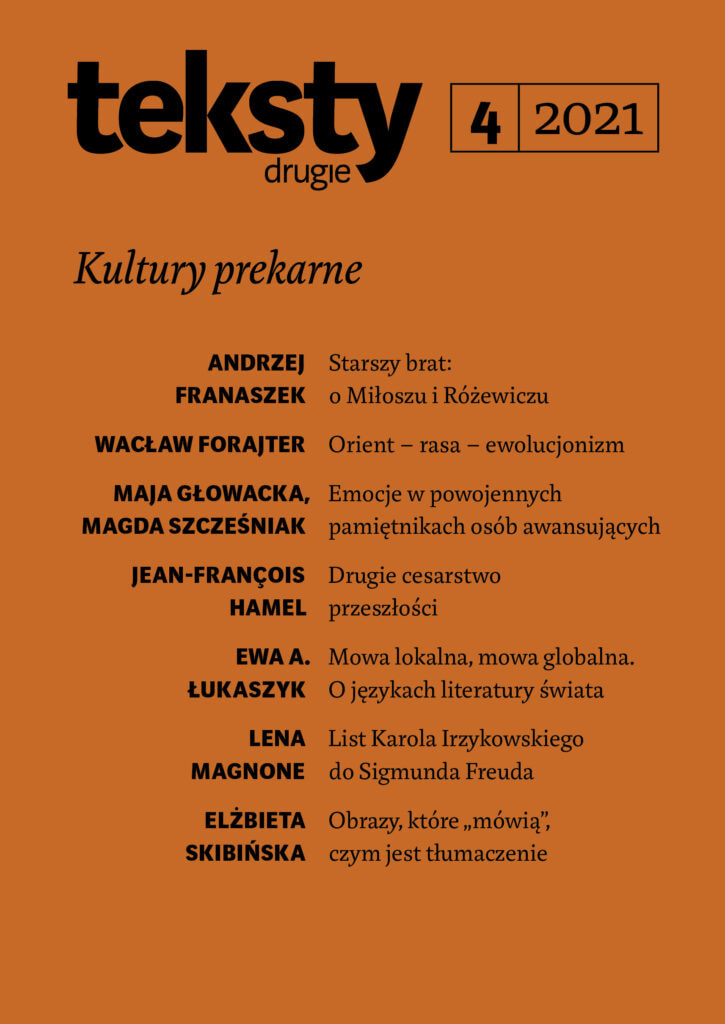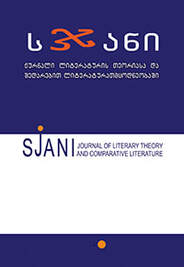the unexplored richness of human literary expression
The universalist claim of the discipline called Comparative Literature (that supposedly died and was reborn in a new, less Eurocentric incarnation) has been criticised on countless occasions, most famously by Gayatri Spivak. This is why I feel the need of opening a new chapter in literary studies, dedicated specifically to verbal expression that is so dissimilar from our own genres that it hardly enters the focus of what is called Comparative Literature, a hegemonic discipline having its name written in capital letters.
Global literary studies is not exactly a discipline: rather an interdisciplinary field of study that focuses on the examination and analysis of literature from around the world. It should explore literary texts in their cultural, historical, social, and political context, overcoming the cultural blindness of plain World Literature translated into English.
Global perspective permits to study the cantigas chanted by women in Guinea Bissau side by side with Occitan tenso. As well as the systems of versification in Mongolian poetry. It also studies the tales on sexual intercourse of humans and djinns told in Socotra, treating them as literature in its full right, not just as an ethnographic curiosity.
The question to be answered is how diverse, rather than how similar, are the forms of human literary expression, how many ways of playing with words actually exist, what is the extent of their richness and diversity. How translatable and how expressive they might be beyond the range of cultures in which they were born.
Global literary studies is not exactly a discipline: rather an interdisciplinary field of study that focuses on the examination and analysis of literature from around the world. It should explore literary texts in their cultural, historical, social, and political context, overcoming the cultural blindness of plain World Literature translated into English.
Global perspective permits to study the cantigas chanted by women in Guinea Bissau side by side with Occitan tenso. As well as the systems of versification in Mongolian poetry. It also studies the tales on sexual intercourse of humans and djinns told in Socotra, treating them as literature in its full right, not just as an ethnographic curiosity.
The question to be answered is how diverse, rather than how similar, are the forms of human literary expression, how many ways of playing with words actually exist, what is the extent of their richness and diversity. How translatable and how expressive they might be beyond the range of cultures in which they were born.
selected essays in global literary studies
(Post)colonial chronopolitics and mapping the depth of local time(s) in global literary studies: an itinerary to Guinea-Bissau
|
Metacritic Journal for Comparative Studies and Theory, no 7.2/2021, p. 69-83. ISSN 2457-8827.
https://www.metacriticjournal.com/article/203/postcolonial-chronopolitics-and-mapping-the-depth-of-local-times-in-global-literary-studies-an-itinerary-to-guinea-bissau This article is an attempt at deconstructing the chronopolitics inherent to the (post)colonial way of thinking about the world. As it is argued, what should replace it is a vision of multiple, overlying temporalities and forms of time awareness, reaching deeper than a literary history reduced to the cycle of colonisation – decolonisation – postcolonial becoming, originating from just a single maritime event: the European exploration and conquest of the world. The essay brings forth a choice of interwoven examples illustrating the variability of local time depths, associated with a plurality of origins, narrations, forms of awareness and cultivation of cultural belonging. It shows the lack of coincidence between the dominant and non-dominant perceptions of the past in such places as the archipelagos of São Tomé and Príncipe, Maldives, the Gambia, Cape Verde and Guinea-Bissau. Their ways of living the global time, as well as embodying significant texts (rather than simply preserving them) stretch far beyond the frameworks created by competing colonial empires, such as the Portuguese or the British one. |
A local tongue, a global tongue. On the languages of World Literature
|
Mowa lokalna, mowa globalna. O językach literatury świata
Teksty Drugie, no 4/2021, p. 60-78. ISSN 0867-0633 The aim of this article is to reflect on multilingual dimension of literature, its ability of transmitting key meanings across the frontiers of cultures, as well as on the status of languages creating literary systems. What makes the actuality of these questions is the growing pace of language death and the decrease of diversity of oral literatures of humanity. This is why it is necessary to close the gap between global literary studies and the endeavours at archiving the patrimony of traditional cultures, as well as studies on literacy and the phenomena accompanying the passage from locally transmitted oral literature to written literature in global circulation. Key hypothesis of this paper concerns the role of planetary literature and transindigenous studies in the preservation of unique conceptualisations of the world transmitted in traditional contexts - in spite of the death of tribal languages. |
Transcultural writing and non-hegemonic universalism. Reading Ali und Nino in the context of global literary studies
|
სჯანი / Sjani: Journal of Literary Theory and Comparative Literature, 21/ 2020, p. 69-80.
ISSN 1512-2514, e-ISSN 2346-772X sjani.ge/?page_id=4624 sjani.ge/sjani-21/evalukaz.pdf Ali und Nino is a novel narrating a romance between a young Muslim and a Christian, set in Baku in the first decades of the 20th century. In the article, it is treated as an example of transcultural writing. After a short presentation of the content of the novel, the author mentions the biography of Lev Nussimbaum published by Tom Reiss, concluding that Kurban Said is a pseudonym hiding an ambiguous figure of an outsider representing the Caucasian reality for his European audience. He is regarded as a precursor of the contemporary transcultural writing, exemplified by Jamyang Norbu and José Eduardo Agualusa; their strategy consists in appropriating alien strands of cultural tradition or literary history. They create hybrid configurations that fill the gaps of the established national literary systems. Similarly, Kurban Said created a syncretic Caucasian novel that did not exist, merging various cultural spheres, as well as national and religious identities in a melting pot of a single narration. In order to study such a phenomenon, new concepts are necessary: those useful concepts include such notions as “dissolution of cultures”, “exotopy”, “transculture”, “pluriversalism”, etc. proposed by Wolfgang Welsch, Mikhail Bakhtin, Mikhail Epstein, Arianna Dagnino, Walter Mignolo. Also, the author comments on the choice of the notion of “non-hegemonic universalism”.
| |||||||
bibliography
Apter, Emily. Against World Literature: On the Politics of Untranslatability. New York: Verso, 2013.
Bhattacharya, Baidik. Postcolonial Writing in the Era of World Literature: Texts, Territories, Globalizations. London: Routledge, 2020.
Cheah, Peng. What is a World? Durham: Duke UP, 2016.
Fyfe, Alexander & Madhu Krishnan, eds. African Literatures as World Literature. London: Bloomsbury, 2022.
Garland Mahler, Anne. From the Tricontinental to the Global South: Race, Radicalism, and Transnational Solidarity. Durham: Duke UP, 2018.
Helgesson, Stefan. Decolonisations of Literature: Critical Practice in Africa and Brazil after 1945. Liverpool: Liverpool UP, 2022.
Kalliney, Peter J. The Aesthetic Cold War: Decolonization and Global Literature. Princeton: Princeton UP, 2022.
Mufti, Amir. Forget English! Orientalisms and World Literatures. Cambridge: Harvard UP, 2016.
Müller, Gesine, Jorge J. Locane & Benjamin Loy, eds. Re-Mapping World Literature: Writing, Book Markets and Epistemologies between Latin America and the Global South. Berlin/Boston: De Gruyter, 2018.
Phaf-Rheinberger, Ineke & Koichi Hagimoto, eds. Geografía caleidoscópicas. América Latina y sus imaginarios intercontinentales. Madrid/Frankfurt: Iberoamericana/Vervuert, 2022.
Phạm, Quỳnh N. & Robbie Shilliam, eds. Meanings of Bandung: Postcolonial Orders and Decolonial Visions. London/New York: Rowman & Littlefield International, 2016.
Bhattacharya, Baidik. Postcolonial Writing in the Era of World Literature: Texts, Territories, Globalizations. London: Routledge, 2020.
Cheah, Peng. What is a World? Durham: Duke UP, 2016.
Fyfe, Alexander & Madhu Krishnan, eds. African Literatures as World Literature. London: Bloomsbury, 2022.
Garland Mahler, Anne. From the Tricontinental to the Global South: Race, Radicalism, and Transnational Solidarity. Durham: Duke UP, 2018.
Helgesson, Stefan. Decolonisations of Literature: Critical Practice in Africa and Brazil after 1945. Liverpool: Liverpool UP, 2022.
Kalliney, Peter J. The Aesthetic Cold War: Decolonization and Global Literature. Princeton: Princeton UP, 2022.
Mufti, Amir. Forget English! Orientalisms and World Literatures. Cambridge: Harvard UP, 2016.
Müller, Gesine, Jorge J. Locane & Benjamin Loy, eds. Re-Mapping World Literature: Writing, Book Markets and Epistemologies between Latin America and the Global South. Berlin/Boston: De Gruyter, 2018.
Phaf-Rheinberger, Ineke & Koichi Hagimoto, eds. Geografía caleidoscópicas. América Latina y sus imaginarios intercontinentales. Madrid/Frankfurt: Iberoamericana/Vervuert, 2022.
Phạm, Quỳnh N. & Robbie Shilliam, eds. Meanings of Bandung: Postcolonial Orders and Decolonial Visions. London/New York: Rowman & Littlefield International, 2016.
international journals in global literary studies
|
Caribbean modernities https://read.dukeupress.edu/small-axe
|
|
Translation Spaces is a biannual, peer-reviewed, indexed journal that recognizes the global impact of translation. It envisions translation as multi-dimensional phenomena productively studied (from) within complex spaces of encounter between knowledge, values, beliefs, and practices. These translation spaces -virtual and physical- are multidisciplinary, multimedia, and multilingual. They are the frontiers being explored by scholars investigating where and how translation practice and theory interact most dramatically with the evolving landscape of contemporary globalization.
https://benjamins.com/catalog/ts |
|
New Literary History focuses on questions of theory, method, interpretation, and literary history. Rather than espousing a single ideology or intellectual framework, it canvasses a wide range of scholarly concerns. By examining the bases of criticism, the journal provokes debate on the relations between literary and cultural texts and present needs.
https://muse.jhu.edu/journal/144 |
|
Literator publishes research articles and essays on linguistics and literature in general, but focuses in particular on the (comparative) study of South African languages and literatures and other cultural phenomena across language, media and cultural boundaries (examples of topics would be: different manifestations of Post-Modernism, the interaction between visual arts and literature, the representation of the South African War in literature, language attitudes and language policy).
https://literator.org.za/index.php/literator |
|
Shima addresses social, cultural, environmental and conceptual aspects of various types of island, peninsular and otherwise insular coastal and shoreline communities, their relationship to the oceanic, estuarine, deltaic, riverine and/or lacustrine environments that substantially define them and the manner in which various types of engineered waterways and bodies of water constitute cultural landscapes in terrestrial locations.
https://www.shimajournal.org/cfp.php |
|
The journal has thus a uniquely broad scope, promoting international research and exchange of ideas on all aspects of ethnicity, nationalism and nation formation, across the globe and both in the past and in the present. It explores the associational, political, legal, cultural, economic, historical, archaeological, psychological, ethnic and anthropological dimensions of the phenomena of nations and nationalism. It deals with inter-ethnic, inter-national and trans-national relations of conflict, accommodation and cooperation, and the various processes and types of nation-state formation. It addresses the diversity of forms that ethnic and national mobilisation movements can take, as well as everyday expressions of national identification. The journal encompasses studies of nations as carriers and agents of cultural value and as sources of cultural creativity, e.g., in literature, music, architecture and the visual arts, and the role of memory and tradition in shaping national identities, communities and states.
https://onlinelibrary.wiley.com/journal/14698129 |
|
Íkala, Revista de Lenguaje y Cultura is a peer-reviewed scientific journal published three times a year in January, May, and September. It is sponsored by the School of Languages at Universidad de Antioquia, covering topics such as language, culture, linguistics, literature, translation, and second/foreign language teaching and learning. Íkala’s mission is to offer an international forum for sophisticated, yet grounded academic debates on issues related to languages and cultures through empirical, conceptual and exploratory research, and creative scholarship; a forum that enriches the discipline, as well as the individual members of a worldwide academic community. Íkala’s main sections include Empirical Studies, Literature Reviews, Theoretical and Methodological Articles, Case Studies, and Book Reviews. Íkala accepts original and unpublished articles in English, Spanish, Portuguese, and French languages. It offers print and online versions available on the Internet through open access. From its inception in 1996, Íkala has welcomed a diversity of voices and languages, as evidenced by its name, meaning "a topic of great importance" in the indigenous language of Tule.
https://revistas.udea.edu.co/index.php/ikala |


